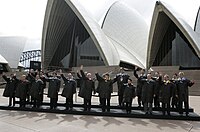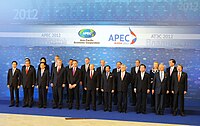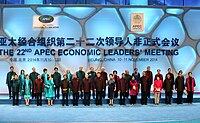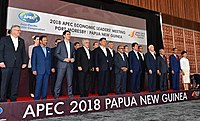Asia-Pacific Economic Cooperation
Asia-Pacific Economic Cooperation (APEC /ˈeɪpɛk/ AY-pek[1]) is an inter-governmental forum for 21 member economies in the Pacific Rim that promotes free trade throughout the Asia-Pacific region.[2] Following the success of ASEAN's series of post-ministerial conferences launched in the mid-1980s,[3] APEC started in 1989,[4] in response to the growing interdependence of Asia-Pacific economies and the advent of regional trade blocs in other parts of the world; it aimed to establish new markets for agricultural products and raw materials beyond Europe.[5] Headquartered in Singapore,[6] APEC is recognized as one of the highest-level multilateral blocs and oldest forums in the Asia-Pacific region,[7] and exerts significant global influence.[8][9][10][11]
"APEC" redirects here. Not to be confused with AIPAC, APAC, or OPEC.
Asia-Pacific Economic Cooperation
Economic meeting
![]() Rebecca Fatima Santa Maria
Rebecca Fatima Santa Maria
1989
The heads of government of all APEC members except Taiwan (which is represented by a ministerial-level official as economic leader)[12] attend an annual APEC Economic Leaders' Meeting. The location of the meeting rotates annually among the member economies, and a famous tradition, followed for most (but not all) summits, involves the attending leaders dressing in a national costume of the host country. APEC has three official observers: the Association of Southeast Asian Nations Secretariat, the Pacific Economic Cooperation Council and the Pacific Islands Forum Secretariat.[13] APEC's Host Economy of the Year is considered to be invited in the first place for geographical representation to attend G20 meetings following G20 guidelines.[14][15]
APEC Study Centre Consortium[edit]
In 1993, APEC Leaders decided to establish a network of APEC Study Centres (APCs) among universities and research institutions in member economies. The purpose is to foster cooperation among tertiary and research institutes of member economies, thus having better academic collaboration on key regional economic challenges. To encourage independence from the APEC conference, the APCs are funded independently and choose their own research topics.[48]
As of December 2018, there are 70 APCs among the member economies. An annual conference is usually held in the host economy for that year.[48]
APEC Business Advisory Council[edit]
The APEC Business Advisory Council (ABAC) was created by the APEC Economic Leaders in November 1995 with the aim of providing advice to the APEC Economic Leaders on ways to achieve the Bogor Goals and other specific business sector priorities, and to provide the business perspective on specific areas of co-operation.[49][50]
Each economy nominates up to three members from the private sector to ABAC. These business leaders represent a wide range of industry sectors. ABAC provides an annual report to APEC Economic Leaders containing recommendations to improve the business and investment environment in the Asia-Pacific region, and outlining business views about priority regional issues. ABAC is also the only non-governmental organisation that is on the official agenda of the APEC Economic Leader's Meeting.[51]
Criticism[edit]
APEC has been criticised for promoting free trade agreements that would impose restrictions on national and local laws, which regulate and ensure labour rights, environmental protection and safe and affordable access to medicine.[64] According to the organisation, it is "the premier forum for facilitating economic growth, cooperation, trade and investment in the Asia-Pacific region" established to "further enhance economic growth and prosperity for the region and to strengthen the Asia-Pacific community".[65] The effectiveness and fairness of its role has been questioned, especially from the viewpoints of European countries that cannot take part in APEC[66] and Pacific Island nations that cannot participate but stand to be affected by its decisions.








































